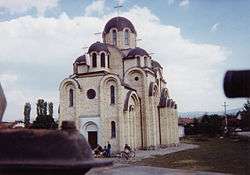Klokot
| Kllokot / Klokot | |
|---|---|
| municipality | |
| Klokot-Vrbovac | |
 | |
 Klokot municipality | |
 Kllokot / Klokot Location in Kosovo | |
| Coordinates: 42°22′N 21°23′E / 42.367°N 21.383°ECoordinates: 42°22′N 21°23′E / 42.367°N 21.383°E | |
| Country | Kosovo[lower-alpha 1] |
| District | District of Gjilan |
| Municipality | 8 January 2010[1] |
| Seat | Klokot |
| Government | |
| • Mayor | Saša Mirković[1] |
| Area | |
| • Total | 23.36 km2 (9.02 sq mi) |
| Population (2011) | |
| • Total | 2,556[1] |
| • Density | 88.9/km2 (230/sq mi) |
| Website | kk.rks-gov.net/kllokoti |
Klokot,[2] officially Klokot-Vrbovac,[3] is a town and municipality in the District of Gjilan of Kosovo. The municipality was established on 8 January 2010 when the first municipal assembly constitutive session was held.[1] Before 2010 it was part of the Vitina municipality.[1] The seat of the municipality is in the town of Klokot.
Since the Government of Serbia does not recognize municipalities of Kosovo established after 1999, it still regards Klokot as part of the Vitina municipality.[4]
Geography
The municipality has a cadastral area of 2,336 hectares. The municipality includes the town of Klokot and three villages:[1]
- (Serbian: Mogila, Albanian: Mogillë)
- (Serbian: Vrbovac, Albanian: Vërboc)
- Grnčar (Serbian: Грнчар, Albanian: Gërnçar)
History
In August 2003, explosive devices planted in Klokot destroyed five Serb houses, with several injuries, including two American KFOR soldiers.[5]
The municipality of Klokot was officially established on 8 January 2010, previously being part of the Vitina Municipality.[1] The seat of the municipality is in Klokot.[3] This and other new-formed municipalities of Kosovo are not recognized by Serbian government, which still considers it part of Vitina municipality.[4] The municipality was formed based on the Ahtisaari plan for decentralization of Kosovo which called for the establishment of a municipality with Serbian majority within the Vitina municipality.
Economy
The economy of the municipality of is mainly based on natural resources (mostly mineral water), tourism (two private spas), agriculture and small trade businesses. Klokot has some important hot-water springs that get up to 32 degrees.[6] There are 29 registered private businesses operating in the municipality.[1]
Public services
There are three elementary schools in the municipality with 599 students and 33 teachers, one secondary school with 147 students and 13 teachers and one kindergarten with 15 children and 2 teachers (As of 2013).[1] Two elementary schools follow Serbian curricula, while one follows Kosovo curricula.[1] The St. Sava Elementary school in Klokot is attended by 250 students (As of 2001) and the secondary school is located in Vrbovac.[7]
The municipality has four Serbian Orthodox churches. The church in Grnčar was mined and destroyed by the Albanians during the Kosovo conflict, and was later fully reconstructed.[1] There is a mosque in village of Mogila which was not damaged during the conflict.
Politics
The first (and most recent to day) municipal elections were held on 15 November 2009.[8] Although Serbian Government did not recognize those elections, 25,4% of local voters, mostly Serbs, did participate in the elections.[9] Serb Saša Mirković was elected mayor.[1][10] Out of 15 members of the municipal assembly, 10 were elected from the Serb Independent Liberal Party, and 5 from the Albanian Democratic League of Kosovo.[1][11]
Demographics
The municipality of Klokot has a mixed population with Serbs and Albanians being the majority. The town of Klokot had 1,500 residents before Kosovo War (1999), and 1,200 in 2001. In the 2011 census the town of Klokot alone had 1,064 residents, 616 Serbs (57.89%), 446 Albanians (41.91%),and 2 others. In 2011 the municipality had 2,556 residents, while the number of residents before the Kosovo War was estimated to 5,000.[1]
Ethnic structure of Klokot municipality according to 2011 census, partially boycotted by Serbs,[12] was:
| Ethnicity | Population | % |
|---|---|---|
| Albanians | 1,362 | 53.29 |
| Serbs | 1,177 | 40.05 |
| Romani | 9 | 0.35 |
| Turks | 1 | 0.04 |
| Others and not specified | 7 | 0.27 |
| Total | 2,556 | 100.00 |
Annotations
- ↑ Kosovo is the subject of a territorial dispute between the Republic of Kosovo and the Republic of Serbia. The Republic of Kosovo unilaterally declared independence on 17 February 2008, but Serbia continues to claim it as part of its own sovereign territory. The two governments began to normalise relations in 2013, as part of the Brussels Agreement. Kosovo has been recognised as an independent state by 108 out of 193 United Nations member states.
References
- 1 2 3 4 5 6 7 8 9 10 11 12 13 14 15 MUNICIPAL PROFILES: Klokot/Kllokot (January 2013), from the OSCE Mission in Kosovo official site, accessed 6 October 2013.
- ↑ United States embassy in Pristina: Playground inauguration Vrbovac, Klokot (October 29th 2009), accessed on 6 October 2013
- 1 2 Statute of the Municipality of Klokot-Vrbovac, dated 30 November 2012, from the official Municipal web site, accessed on 6 October 2013 Archived October 6, 2014 at the Wayback Machine
- 1 2 Law on Territorial Organization of the Republic of Serbia (in Serbian), adopted on 29 December 2007, from the official web site of the Parliament of Serbia , accessed on 6 October 2013.
- ↑ Serbian Studies 18. North American Society for Serbian Studies. 2004. p. 315.
- ↑ ASIN 3897941414
- ↑ "We Are Imprisoned Here Like on Reservation". Blic. 13 January 2001. Retrieved 12 March 2012.
- ↑ KIM radio: Sve spremno za izbore u opštini Klokot-Vrbovac (27.10.2009) (Serbian)
- ↑ KIPRED: Decentralization in Kosovo I: Municipal elections and the Serb participation
- ↑ KIM radio: Održana druga sednica decentralizovane opštine Klokot (02 Feb 2010) (Serbian)
- ↑ KIM radio: Decentralizovana opština Klokot održala prvu sednicu Skupštine (21 Jan 2010) (Serbian)
- ↑ "ECMI: Minority figures in Kosovo census to be used with reservations". ECMI.
External links
| ||||||||||||||||||||||||||||||||
